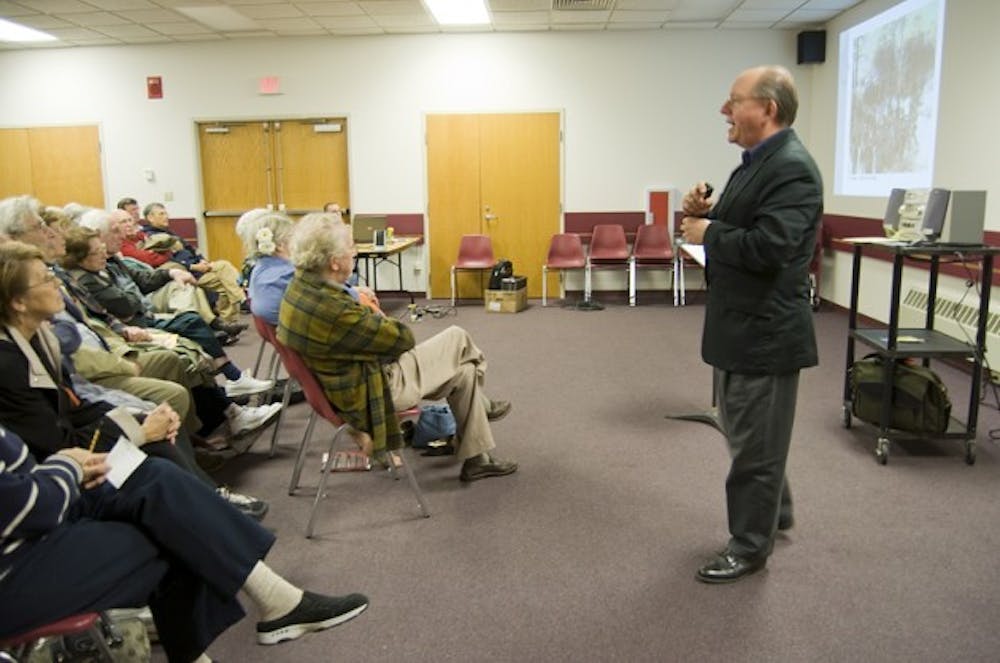In an age dominated by rock bands, auto-tune, computerized beats and Lady Gaga, classical music has been all but forgotten. The times of dressing up nicely to go see a featured musician supported by a 70-piece orchestra are long gone.
But classical is not dead.
Berenika Zakrzewski, known commonly by just her first name, is a rising 27-year-old concert pianist from Canada. From Poland With Love, which takes place Saturday at Klienhans Music Hall, is a show that features music from various parts of Polish history.
Frederic Chopin, the Polish composer whose 200th birthday is being celebrated this year, is one of the featured composers. Also to be featured are pieces from Polish composers Karol Szymanowski and Witold Lutoslawki.
Paul Ferington, the Buffalo Philharmonic Orchestra conductor, was in the Amherst Audubon Library Wednesday night previewing the concert. He shed light on some of Poland's history.
The November Uprising broke out in 1830. Young conspirators forced Russian troops out of Warsaw, only to be crushed in retaliation by the Russian army. Chopin was outraged, and from his torment he wrote Etude Op. 10, No. 12 in C minor, known as "The Revolutionary Etude." He never returned to Poland.
However, Chopin's music was drastically different than most compositions of the time.
"He liberated the piano from the likes of Beethoven," Ferrington said. "He made it less serious than the pounding and drama that Beethoven was famous for… His music was technically and expressively demanding. Technically, it was like finger gymnastics."
Expressively, Chopin innovated "new pianism," which featured a notation in music known as rubato. His melodies and phrasing sped up and slow down, stretching the time signature that usually kept consistent beats in sync.
One can instantly recognize his work, which is characterized by light melodies that keep the music very intimate. Chopin realized his style was not suited for a large concert hall and, in 1832, began limiting his performances to private and smaller occasions. Despite his international success, Chopin stayed true to his Polish heritage in his music.
Lutoslawki, Chopin's countryman, also shows influences of Polish folk music.
Unlike Chopin, Lutoslawki, who was born in 1913, stayed in Poland and developed as a musician in a very restrictive regime under the Prussians.
His folk music roots dominated his earlier work, but he eventually composed in a 12-tone system. This allowed him to build dense chords over time and in intervals, resulting in a very dissident tone.
"It's out there," Ferrington said. "But it's very [tragic] music."
Lutoslawki was forced to refuse all Polish engagements in 1981, when martial law was declared in Poland. The Chicago Symphony Orchestra recorded his Symphony No. 3 two years later. This recording was sent to the workers in the Gdansk shipyards in support of their protest, a key to the fall of communism.
The last composer is perhaps the most complete. Szymanowski began his career composing very rich and grandiose pieces, mimicking German composer Richard Strauss. Szymanowski also drew influences from the East, Northern Africa and the Mediterranean.
Like Chopin, he wrote mazurkas, Polish folk dances in three beats. Szymanowski began focusing on folk music after settling in Zakopane in the more mountainous region of Poland. He composed creative melodies and harmonies while adding a dance flavor that separated him from other folk composers.
All three composers will be represented Saturday night.
"Student tickets will be available at a reduced price," Ferrington said. "This is an opportunity for students to go and see a bright young performer their age."
E-mail: arts@ubspectrum.com





